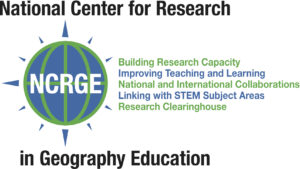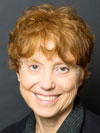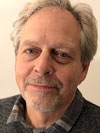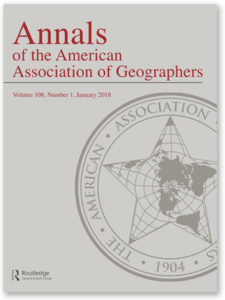Nora Newcombe and David Lambert to Keynote Geography Education Research Track at 2018 AAG Annual Meeting
 The National Center for Research in Geography Education (NCRGE) is pleased to announce keynotes by Nora Newcombe and David Lambert for a special track of geography education sessions during the 2018 AAG Annual Meeting in New Orleans.
The National Center for Research in Geography Education (NCRGE) is pleased to announce keynotes by Nora Newcombe and David Lambert for a special track of geography education sessions during the 2018 AAG Annual Meeting in New Orleans.
The keynotes by Professors Newcombe and Lambert are respectively scheduled for 1:20 – 3:00 PM and 3:20 – 5:00 PM on Thursday, April 12 in Room Galerie 2 in the Marriott French Quarter Hotel. Both exemplify the type of work and thinking that is driving current innovative approaches to researching geographic and spatial learning.
Nora Newcombe’s lecture, “GPS in Our Heads: What Do Behavioral and Neural Data on Navigation Offer to Geography Educators?”, engages the long and controversial proposal that humans can develop cognitive maps of their environment. This talk will give a high-level overview of recent advances in understanding how people navigate at the behavioral and neural levels of analysis, from a wide variety of human as well as non-human species, studied from infancy through aging. Newcombe will also examine development and individual differences. For example, children of three to eight years show progressive increases in their proficiency at combining sources of information. By around 12 years, they show adult-level performance on cognitive mapping tasks requiring the integration of vista views of space into environmental space but also show large individual differences in accuracy. Finally, Newcombe will discuss the relevance of this body of knowledge for geography educators, and present data on the effect of GIS experience on spatial thinking.
Following Newcombe’s lecture, David Lambert will deliver a lecture entitled “Nurturing the ‘Garden of Peace’: Powerful Geographical Knowledge and the Pursuit of Real Education.” The work on which Lambert’s talk is based was in part stimulated by a paper by David Wadley that appeared in the Annals of the AAG some ten years ago. A retort to neoliberal orthodoxies, Wadley’s paper “The Garden of Peace” made a special case for the role of education in helping us resist the famous Thatcher line that ‘there is no alternative’. This democratic sentiment was not dissimilar to the thinking that fueled the Geographical Association’s 2009 ‘manifesto’ entitled A Different View, which was an explicit endorsement of the western liberal traditions in education – essentially, that to be educated means that you can think in a reasoned manner, and for yourself. Lambert’s talk explores what has followed from these beginnings, especially in the context of Michael Young’s concept of ‘powerful knowledge’ and its influence on curriculum thinking. One aspect of Young’s recent work is the distinction he now makes about power: that is, between the power over someone/something and the power to be able to do something. Lambert will explore whether geographical knowledge, such as that which is taught in schools and colleges, can be considered ‘powerful’ – and if so in what way? In terms of the capabilities it affords those who possess it, powerful knowledge must be considered a pedagogic right to all – not just the ‘academically gifted’ or the elite. Lambert will conclude by discussing the ambition and potential of powerful knowledge in geography education, as well as its major challenges and difficulties.
About the National Center for Research in Geography Education
NCRGE is a research consortium with headquarters at the American Association of Geographers and Texas State University. Funded by grants from the National Science Foundation, private foundations and other agencies, NCRGE works to build capacity for transformative research in geography education.
Each year at the AAG Annual Meeting, NCRGE organizes a track of research-oriented geography education sessions and workshops to highlight contemporary work in the field and advance the development of a research coordination network. The sessions planned for the 2018 meeting in New Orleans will illustrate the dynamism and breadth of research, theory, and practice in geography education and how geographers and educational researchers are engaged in collaborative work to address contemporary challenges affecting the discipline.
AAG members and others interested in geography education research are encouraged to join the NCRGE research coordination network by completing an application at www.ncrge.org/rcn.
About the Speakers
 Nora S. Newcombe is Laura H. Carnell Professor of Psychology at Temple University. She received her B.A. in 1972 from Antioch College and her Ph.D. in 1976 from Harvard University. Her research focuses on spatial cognition and development, and the development of episodic memory. She is currently Principal Investigator of the NSF-funded Spatial Intelligence and Learning Center (SILC) whose purpose is to develop the science of spatial learning and to use this knowledge to support children and adults in acquiring scientific, technical, engineering, and mathematical (STEM) skills. Dr. Newcombe is the author of numerous publications including Making Space with Janellen Huttenlocher (MIT Press, 2000). She has received numerous awards, including the Distinguished Scientific Contributions Award from SRCD (2015), the William James Award from APS (2014), the George A. Miller Award for an Outstanding Recent Article in General Psychology (twice, 2004 and 2014) and the G. Stanley Hall Award for Distinguished Contribution to Developmental Psychology (2007). She was elected to the American Academy of Arts and Sciences (2006) and to the Society of Experimental Psychologists (2008). She has served as Editor of the Journal of Experimental Psychology: General and Associate Editor of Psychological Bulletin, has been a Visiting Professor at the University of Pennsylvania, Princeton, and the Wissenschaftskolleg in Berlin. She is currently the Past Chair of the Governing Board of the Cognitive Science Society, Chair of Section J (Psychology) of the American Association for the Advancement of Science, and President-Elect of the Federation of Associations of Behavioral and Brain Sciences.
Nora S. Newcombe is Laura H. Carnell Professor of Psychology at Temple University. She received her B.A. in 1972 from Antioch College and her Ph.D. in 1976 from Harvard University. Her research focuses on spatial cognition and development, and the development of episodic memory. She is currently Principal Investigator of the NSF-funded Spatial Intelligence and Learning Center (SILC) whose purpose is to develop the science of spatial learning and to use this knowledge to support children and adults in acquiring scientific, technical, engineering, and mathematical (STEM) skills. Dr. Newcombe is the author of numerous publications including Making Space with Janellen Huttenlocher (MIT Press, 2000). She has received numerous awards, including the Distinguished Scientific Contributions Award from SRCD (2015), the William James Award from APS (2014), the George A. Miller Award for an Outstanding Recent Article in General Psychology (twice, 2004 and 2014) and the G. Stanley Hall Award for Distinguished Contribution to Developmental Psychology (2007). She was elected to the American Academy of Arts and Sciences (2006) and to the Society of Experimental Psychologists (2008). She has served as Editor of the Journal of Experimental Psychology: General and Associate Editor of Psychological Bulletin, has been a Visiting Professor at the University of Pennsylvania, Princeton, and the Wissenschaftskolleg in Berlin. She is currently the Past Chair of the Governing Board of the Cognitive Science Society, Chair of Section J (Psychology) of the American Association for the Advancement of Science, and President-Elect of the Federation of Associations of Behavioral and Brain Sciences.
 David Lambert is Professor of Geography Education at University College London Institute of Education (UCL – IOE). Obtaining his BA from the University of Newcastle in 1973 he went on to his post graduate professional training at the University of Cambridge. He was a secondary school teacher for twelve years, becoming a deputy principal of a comprehensive school. He became a university teacher-educator from 1986, developing research interests in curriculum, pedagogy and assessment in geography education. His school textbook series Jigsaw Pieces published by Cambridge University Press won the TES school book of the year award in 1991. Receiving his doctorate in 1995 from the University of London, he rose to become Assistant Dean for teacher education in 1999. He left temporarily the academy in 2002 when he was appointed full-time chief executive of the Geographical Association (GA) (www.geography.org.uk). He returned to the IOE as professor in 2007 and was awarded the Royal Geographical Society Taylor Francis Award for leadership in geography education in 2015. Recent books include Knowledge and the Future School (2014), Learning to Teach Geography (3rd Edition, 2015), and Debates in Geography Education (2nd Edition, 2017). He chairs the Editorial Collective of Geography and serves as Associate Editor of International Research in Geographical and Environmental Education. He led the European Union funded GeoCapabilities project from 2013-17 (www.geocapabilities.org).
David Lambert is Professor of Geography Education at University College London Institute of Education (UCL – IOE). Obtaining his BA from the University of Newcastle in 1973 he went on to his post graduate professional training at the University of Cambridge. He was a secondary school teacher for twelve years, becoming a deputy principal of a comprehensive school. He became a university teacher-educator from 1986, developing research interests in curriculum, pedagogy and assessment in geography education. His school textbook series Jigsaw Pieces published by Cambridge University Press won the TES school book of the year award in 1991. Receiving his doctorate in 1995 from the University of London, he rose to become Assistant Dean for teacher education in 1999. He left temporarily the academy in 2002 when he was appointed full-time chief executive of the Geographical Association (GA) (www.geography.org.uk). He returned to the IOE as professor in 2007 and was awarded the Royal Geographical Society Taylor Francis Award for leadership in geography education in 2015. Recent books include Knowledge and the Future School (2014), Learning to Teach Geography (3rd Edition, 2015), and Debates in Geography Education (2nd Edition, 2017). He chairs the Editorial Collective of Geography and serves as Associate Editor of International Research in Geographical and Environmental Education. He led the European Union funded GeoCapabilities project from 2013-17 (www.geocapabilities.org).


